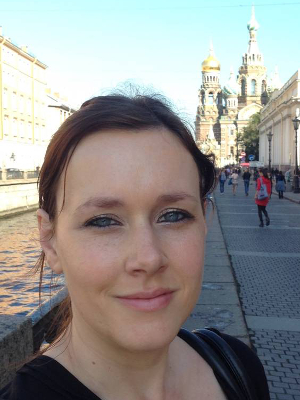
Carla Pretorius is currently conducting research in
Inorganic Chemistry at the St Petersburg University,
Russia. Photo:Supplied |
Carla Pretorius completed her PhD in Inorganic Chemistry recently, with a thesis entitled “Structural and Reactivity Study of Rhodium(I) Carbonyl Complexes as Model Nano Assemblies”, and has just received her results. The assessors were very impressed, and she will graduate at the next UFS Summer Graduation in December 2015.
She is currently conducting research in St Petersburg, Russia, by invitation. She is working in the group of Prof Vadim Kukushkin of the St Petersburg University, under a bilateral collaboration agreement between the groups of Prof Kukuskin (SPBU) and Prof André Roodt (Head of the Department of Chemistry at the UFS).
Her research involves the intermetallic rhodium-rhodium interactions for the formation of nano-wires and -plates, with applications in the micro-electronics industry, and potentially for harvesting sun energy. She was one of only three young South African scientists invited to attend the workshop “Hot Topics in Contemporary Crystallography” in Split in Croatia during 2014. More recently, she received the prize for best student poster presentation at the international symposium, Indaba 8 in Skukuza in the Kruger National Park, which was judged by an international panel.
Carla was also one of the few international PhD students invited to present a lecture at the 29th European Crystallographic Meeting (ECM29) in Rovinj, Croatia (23-28 August 2015; more than 1 000 delegates from 51 countries). As a result of this lecture, she has just received an invitation to start a collaborative project with a Polish research group at the European Synchrotron Research Facility (ESRF) in Grenoble, France.
According to Prof Roodt, the ESRF ID09B beam line is the only one of its kind in Europe designed for time-resolved Laue diffraction experiments. It has a time-resolution of up to one tenth of a nanosecond, after activation by a laser pulse 100 times shorter (one tenth of a nanosecond when compared to one second is the equivalent of one second compared to 300 years). The results from these experiments will broaden the knowledge on light-induced transformations of very short processes; for example, as in photochemical reactions associated with sun energy harvesting, and will assist in the development of better materials to capture these.